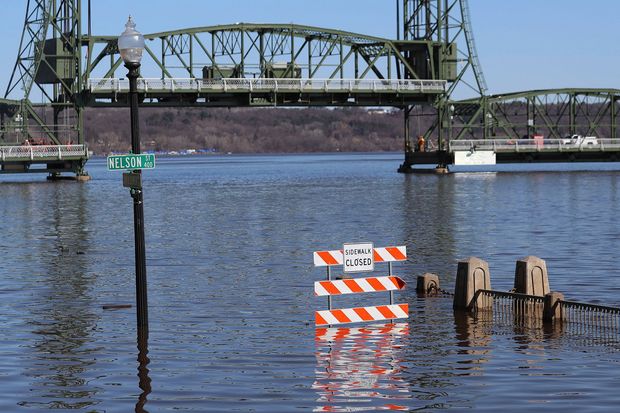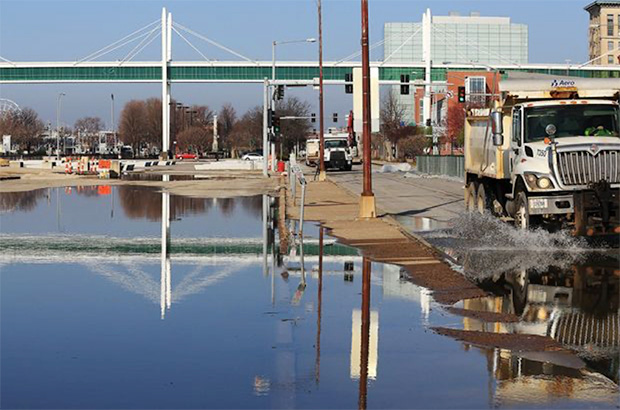
PRESS By Joe Barrett
Updated April 12, 2020 3:16 pm ET
Cities along the Mississippi River are fighting emergencies on two fronts: Covid-19 is straining health-care systems and hitting tax revenue just as officials are faced with spring flooding and the coming hurricane season.
“We are dealing with some unprecedented times in local government to manage two disasters simultaneously,” said Sharon Weston Broome, mayor of Baton Rouge, La., and co-chair of the Mississippi River Cities and Towns Initiative, which represents about 100 mayors.
These cities have been scrambling to get enough personal protective gear for medical workers on the front lines of the coronavirus fight—as well as to first responders who could be called upon for flood evacuations. Meanwhile, repair from last year’s flooding has been delayed due to high water in New Orleans and elsewhere, and East St. Louis is scrambling to build a Covid-19 testing site and complete flood repairs amid a financial emergency.
This is all playing out in cities where a total of 15,000 people had been diagnosed with Covid-19 as of last Thursday.

The U.S. is coming off one of the wettest years on record with some of the worst flooding ever seen in many places.
The Mississippi has been high for several weeks as snow melted in the north and a big rain system moved through the center of the country, said Corey Loveland, service coordination hydrologist with the North Central River Forecast Center of the National Weather Service.
“We’re at a critical time when we’re vulnerable to any additional rainfall,” he said.
Now, the highest river level from snowmelt—what river watchers call a crest—is beyond Davenport, Iowa, and working its way south. A storm system stretching from the Southwest into the Great Lakes this weekend could bring flooding and prolong the crest. The next few weeks, however, are expected to be mostly dry, allowing the surge from snowmelt to work its way south without too much additional flooding.
“Once this flood works its way through, right now we’re not expecting a second round,” said Shawn Carter, a hydrologist with the weather service’s National Water Center in Tuscaloosa, Ala.
New Orleans Mayor LaToya Cantrell said her city, which had 5,600 reported cases of Covid-19 and 235 deaths as of Sunday—one of the highest rates in the nation—is expecting cases to peak soon. The river has been high enough that the U.S. Army Corps of Engineers on April 3 opened the Bonnet Carre Spillway to reduce flooding in New Orleans for an unprecedented third year in a row.
Ms. Cantrell is also worried about the approaching hurricane season, which starts June 1. She said the city of 391,000 has to take into account whether it will still be dealing with large numbers of Covid-19 patients in hospitals and its convention center in the event that a hurricane requires a mass evacuation. “We’re re-evaluating our emergency plan right now,” she said.
Mayor Errick D. Simmons of Greenville, Miss., said the city of 34,000 has been facing heavy rains and a rising river that has also shut down repairs from last year’s flooding, which caused some $4 million in damage.
Some residents are still in temporary housing from last year’s floods, and now the city is dealing with mass unemployment from the coronavirus shutdown. With a poverty rate of 30.6%, the mayor said, “we have almost no capacity to deal with this at all.”
The city is in a county with 48 Covid-19 cases and two deaths, and the mayor said it is clear that most of the cases were spread in church or church-related functions, so the city was forced to ban in-person services this week.
“We have to do this to protect life,” he said.
East St. Louis, Ill., a poor and largely African-American city directly across the river from St. Louis, Mo., is also in dire straits financially.
The city normally gets about 60% of its general-fund revenue from the Casino Queen, a riverboat casino that is shut down along with all other nonessential businesses in the state.
City officials said they also recently ended a several-month period in which payments from the state were diverted to underfunded police and fire pension funds.
“We were just coming off the cusp of that and then we get hit with the coronavirus,” said Mayor Robert Eastern III.
The city of 27,000, which is in a county with 173 cases of Covid-19 and seven deaths, is working with the National Guard to set up a testing facility, the mayor said. It is also eyeing flood levels closely.
Damage from last year’s flooding means the jail at City Hall and a veterans home are at risk of flooding and evacuation if necessary repairs to the city’s storm and sewer drains aren’t undertaken soon.
“It’s a very scary time for our city,” Mr. Eastern said.